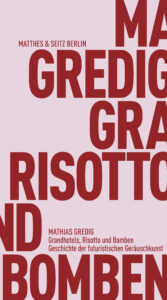Bombs and course rooms
Mathias Gredig deals with futuristic noise art in this sometimes somewhat digressive book.

On April 21, 1914, the futuristic Intonarumori were presented at the Teatro Dal Verme in Milan. However, Luigi Russolo's sound machines were not well received by the audience. The second piece, Si pranza sulla terrazza del Kursaalwhich, from the title, is a rather idyllic scene, there was a tumultuous riot. Italy also had its scandal, but it remained far less well known than Stravinsky's Sacre or at the Vienna Watschenkonzert in 1913. Yes, it has something picturesque about it.
The topic was a natural choice for a musicologist who wrote his doctoral thesis on animal music and has devoted himself to the musical environment of hotels and spas for some time now: Mathias Gredig. Taking this scandal as his starting point, he explores the contrasting context in which Futurism is to be understood, not only as an art that pushes boundaries, but also as one that sees itself as part of tradition. Russolo, for example, vehemently resisted understanding his sounds as naturalistic. The critic Agostino Cameroni received a slap in the face for this.
In seventeen chapters, Gredig succeeds in placing Russolo's work between extremes, between a peaceful hotel lobby and the war enthusiasm of Marinetti, the founder of Futurism, between pleasant sonority and an orgy of noise, between seclusion and provocation. Russolo's radicalism was perhaps not so radical after all, but also a biography, as was not entirely unusual at the time.
You have to love the art of digression to fully enjoy this little book. Gredig likes to digress, for example to delve into cooking risotto or throwing bombs. Sometimes he gets into speculation, sometimes he is a little hasty and you want a few more explanations, and a few times he is a little too casual, for example when he writes about musicians who were killed and ended up in a coffin. An underlying irony can be felt almost throughout, for example towards the initially not so anti-fascist Toscanini.
At the end is a destroyed idyll: the shattered musical instruments in the Hotel Kursaal Diana in Milan after the explosion on March 23, 1921.
Mathias Gredig: Grandhotels, Risotto und Bomben, Geschichte der futuristischen Geräuschkunst, Fröhliche Wissenschaft 232, 173 p., € 15.00, Matthes & Seitz, Berlin 2024, ISBN 978-3-7518-3012-6







